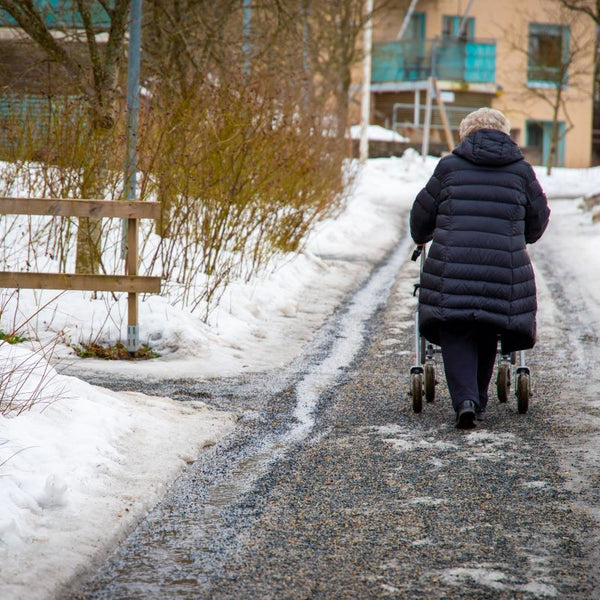Our latest campaign, #HaveTheTalk, aims to foster honest and open discussions about elderly care and the role technology can play in supporting older adults.
Our survey revealed that many people find it easier to talk about topics like death and money than broaching the subject of care. With #HaveTheTalk, we’re removing the stigma surrounding this issue and encouraging families to have meaningful conversations about care planning.

As part of the campaign, we discussed with psychologist Dr Soha Daru why it is difficult to talk about ageing and elderly care.
Dr Daru has shared with us her insights and tips to help families discuss the subject of eldercare.
Why might it be difficult for adult children to have conversations about care with their elderly relatives?
“The topic of elderly care can bring up all sorts of fears and anxieties for both adult children and their relatives. This could range from a fear of offending and upsetting the relative, to a general denial around the fact that they are getting older and might need additional care. There can sometimes be a cultural element involved especially in communities where caring for parents is an expectation and not doing so can be seen as ‘selfish’ or ‘uncaring’.
These fears and anxieties are perfectly normal and understandable. Seeing those who were in a position of authority or formerly cared for us and are now in need of that care can be difficult to see and deal with.
Dr Soha Daru
This shift in role dynamic, as well as the loss of independence, physical strength and general capacity can bring up all kinds of emotions such as sadness, grief and anger.
HCPC registered Counselling Psychologist
“It is important to acknowledge that these are completely valid feelings that most of us will experience at some point in life. It can, however, lead to avoiding important conversations about elderly care that could actually help our relatives in the long run.”
Do you have any tips for having challenging conversations? What is the best approach to persuade elderly parents to accept help?
1. Acknowledge the sensitivity of the conversation, for both yourself and your parent
“Firstly, acknowledging the uncomfortable nature of these conversations without judgement is an important first step.
“The topic of elderly care can bring up all sorts of fears and anxieties for both adult children and their relatives.
“These fears and anxieties are perfectly normal and understandable. It can be difficult to see those who were in a position of authority, or who formerly cared for us, now being the ones who need care and support, and this is something that many people struggle to deal with emotionally.
It can also be useful to put ourselves in the shoes of the elderly relative who might already be experiencing a loss of certain abilities and perhaps a decrease in independence.
Dr Soha Daru
HCPC registered Counselling Psychologist
“This shift in role dynamic, as well as the loss of independence, physical strength and general capacity can bring up all kinds of emotions such as sadness, grief and anger.
“It is important to acknowledge that these are completely valid feelings that most of us will experience at some point in life.”
2. Create a safe environment to have the conversation
“Creating a safe environment is a crucial starting point to any productive discussion.
“Try to choose a time to have the conversation where both parties are fairly relaxed and there are no distractions.
“Listen to your relative non-judgmentally and respect their needs and opinions, as this can go a long way in having a collaborative conversation.”
3. Use the right language to show that you are on their side
“It’s really important to show your elderly parents that you are on their side, rather than pushing your own agenda, as this will help them to open up to you. For example, ask them what they might have already thought about their elderly care. This will then make it easier to discuss options for care together.
Try to express your thoughts and feelings with ‘I’ statements, as this avoids any blaming language which could make a person defensive. Focus on your own concerns and feelings about your parent, rather than challenging their behaviour.
Dr Soha Daru
HCPC registered Counselling Psychologist
“For example, “I’m worried about how you would cope if you had a fall whilst you are out in the garden” is a much better way to phrase your concerns than something accusational like “you wouldn’t know what to do if you had a fall whilst you’re on your own in the garden.”
4. Exercise patience – you may need to have multiple conversations
“Sharing too much information in one go can leave people feeling overwhelmed; doing so in bite-sized chunks can be more effective.
“Empathise with your parent in a calm manner and exercise patience by having multiple conversations if needed.
“It might also be helpful to prepare for the conversation in advance and share practical examples of how and where they might need elderly care based on their current situation.”
5. Focus on the benefits and independence care support can give
“Conversations around elderly care can sometimes feel as if the elderly are losing their independence, so focus on explaining that having additional support can be freeing and actually enable this sense of independence.
“At the end of the day, the elderly have a right to choose how they want to live their lives, and being respectful of their choice should be the undertone of the conversation.”
How to talk to Mum or Dad about getting a personal alarm
Fall alarms and in-home monitoring offer peace of mind that help is always available when you cannot be with your loved ones.
We’ve put together a step-by-step guide to help you talk to your elderly loved ones about the benefits of having a personal alarm.






